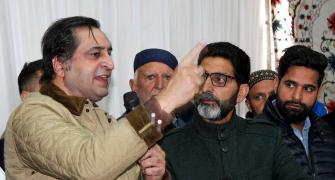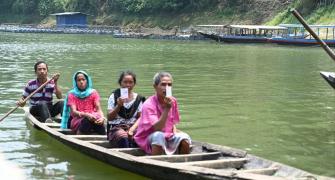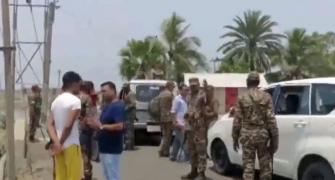Two days after a combative Congress President Sonia Gandhi sounded the strongest support to Prime Minister Manmohan Singh over the controversy, Parliamentary Affairs Minister Pawan Kumar Bansal said the cat is out of bag that the Opposition wants to put the PM in the dock to throw mud at his clean image.
"If the Opposition is insisting on a JPC only to summon the prime minister and ministers, I am afraid they will not have their say," he said in retaliation to the Opposition arguing that Public Accounts Committee of Parliament does not have powers like JPC to summon any minister.
No matter Parliament is adjourned every day without transacting business because of the Opposition creating daily pandemonium, the government will have the winter session's full run as scheduled up to December 13, that is two weeks more, Bansal declared.
Parliament was shut down for the 11th day running on Thursday without transacting any substantive business, costing the taxpayer a staggering sum of Rs 85.80, crore as expenditure on each day of the session is calculated at Rs 7.8 crore.
This is, however, not for the first time that Parliament remains paralysed for days together. JPCs have been constituted only after the government of the day finds no other way to restore order in the two Houses.
Parliament was paralysed in 2001 for 14 days before the then National Democratic Alliance government conceded the JPC probe into the stock exchange scam involving broker Ketan Parekh.
Bansal said the government will not buckle under pressure by adjourning it sine die to escape the Opposition's heat, but "will try to reason out with it every day to discuss the issues agitating them in Parliament instead of running away by engineering
the adjournments."
It is Bansal whose prime task is to coordinate with the Opposition for the smooth running of Parliament and he has been meeting the Opposition leaders almost every second day to try and break the deadlock, though without success.
Even Finance Minister Pranab Mukherjee, in his capacity as leader of the House (Lok Sabha) held two luncheon meetings in the last two weeks offering other options, like a probe by Parliament's PAC, assisted by multi-disciplinary investigative agencies.
He argued that these agencies, including the Central Bureau of Investigation and Enforcement Directorate, will take orders from the PAC and its chairman Murli Manohar Joshi of the BJP and the Opposition can dig out more with their assistance than the JPC limited to call papers and examine them.
While the PAC is a permanent mechanism of Parliament for examining the adverse audit reports against the government, the JPC is required to be constituted through a parliamentary resolution for investigating a specific matter, every time a need arises.
There have been four JPCs in Parliament's history, the first on Bofors kickbacks constituted in 1987 with B Shankaranand of the Congress as chairman; the second headed by Congress leader Ram Niwas Mirdha set up in 1992 to probe irregularities in securities and banking transactions in the aftermath of the Harshad Mehta scandal; the third on the Ketan Parekh scam in 2001; and the last in 2003 on pesticide residues in fruit juices, soft drinks and beverages that was headed by Sharad Pawar.





